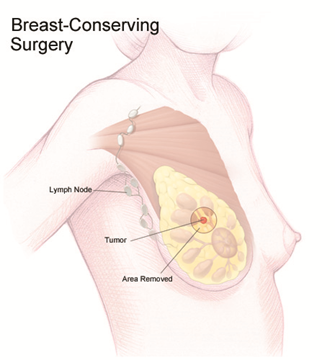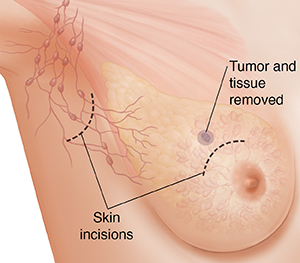Tumor Removal With a Lumpectomy in the Dominican Republic

If you have recently been diagnosed with breast cancer, you will be faced with some tough decisions about the treatment you will receive. Depending on the stage, type, location, and other factors, your surgeon may recommend you undergo a lumpectomy procedure. But, what is a lumpectomy?
Lumpectomy is a surgical procedure to remove breast tumors and other abnormal tissue from the breast. It is also referred to as breast-conserving surgery or breast-preservation surgery because only a portion of the breast is removed, not the entire breast as with a mastectomy.
Today, more and more people choose to have their lumpectomy surgery in the Dominican Republic. The country has become an emerging medical tourism destination, visited by 25,000 medical tourists each year. Lumpectomy is one of the most sought-after procedures in the country since waiting lists are extremely short and patients do not have to wait a long time, and they can benefit from the affordable costs that the medical centers offer.
Let’s take a look at everything you need to know about a lumpectomy and why you people are going to the Dominican Republic for this Procedure.
Why is a lumpectomy performed?
The aim of lumpectomy is to remove the tumor and other abnormal tissue from the breast, while still maintaining the appearance of the breast. You may be suggested to undergo a lumpectomy if a biopsy has shown that you have cancer in the breasts, and the cancer is believed to be small and in its early stages. In some cases, a lumpectomy is also performed to remove certain precancerous or noncancerous breast abnormalities. However, lumpectomy cannot be done on all breast cancer patients. You may not be an ideal candidate for the procedure if you:
- Have more than one tumor in different areas of the breast that cannot be removed with a single excision, this could affect the look of your breast.
- Have a history of scleroderma, which is a group of diseases that causes the skin and other tissues to harden, making healing difficult.
- Have had radiation treatment before, making further radiation treatments too dangerous for you.
- Have a history of systemic lupus erythematosus, which is a chronic inflammatory disease that can get worse if you undergo radiation treatments.
- Have cancer spread all over the breast region and skin, so lumpectomy may not be able to remove the cancer completely.
- Have small breasts and a large tumor. This may cause unsatisfactory cosmetic results.
- Do not have access to radiation therapy.

How do I prepare for a lumpectomy in the Dominican Republic?
Once you have found a skilled surgeon in the Dominican Republic to perform the lumpectomy and have arranged the date for the surgery, your surgeon or medical travel team may tell you what you should and should not do ahead of the surgery.
You will fly to the country a few days before your lumpectomy to meet with your surgeon. Make sure to ask questions’ regarding the procedure as it is important that you understand everything about it, including the risks and benefits. You may also need to bring a copy of your medical records for your surgeon to see.
Tell your surgeon about any medications, vitamins, or supplements you are taking in case they could interfere with your surgery. Your surgeon will give you pre-surgical restrictions that you have to follow. The restrictions may include:
- Avoid aspirin or other blood-thinning medication.
- Do not eat or drink anything 8 to 12 hours prior to surgery.
- Bring someone with you.
What can I expect during a lumpectomy?
On the day of the surgery, your surgeon will first locate the area of the breast containing the abnormality. If the tumor cannot be seen or felt, your surgeon will use a mammogram or ultrasound to locate and mark it. Your surgeon or a nurse may mark the area where the incision will be made using a felt-tip marker. Then, a nurse will give you general anesthesia, so you will be asleep and will not feel anything throughout the surgery.
Your surgeon begins the surgery by making an incision over the tumor or around the natural curve of your breast, so the scars will not be visible. Then, the tumor and some surrounding tissue are removed and sent to the lab for analysis. The final step is closing the incisions with attention to preserving the appearance of the breast using stitches that will either dissolve on their own or be removed by your doctor a few weeks after the surgery. The whole procedure takes around 15 to 40 minutes to complete.

What happens after a lumpectomy in the Dominican Republic?
Once the surgery has completed, you will be taken to a recovery room where your pulse, breathing, and blood pressure will be monitored. Unless you are also having lymph nodes removed, you will be allowed to leave the hospital on the same day once your condition is stable. However, you should plan to stay in the Dominican Republic for about 1-2 weeks as you will need to let your body to heal first and your surgeon will schedule several follow-up checkups.
During the follow-up checkup, your doctor will:
- Monitor your overall health.
- Remove the stitches (usually 7 to 14 days following the surgery) if the surgeon does not use stitches that dissolve over time.
- Explain the results of your pathology report.
If the results of your pathology report show that you need more treatment, your surgeon may recommend:
- More surgery if the margins around your tumor still have cancer.
- See a medical oncologist to discuss other forms of treatment, such as chemotherapy or hormone therapy.
- See a radiation oncologist to consult about radiation treatments.
You can choose to have the treatments in the Dominican Republic or back at home in your local hospital. You may also need to have radiation therapy five times a week, usually for around five to seven weeks following the lumpectomy surgery, which you can also choose to undergo in the Dominican Republic or at home.
Your surgeon will also give you information about recovering both at the hospital and once you get home from the Dominican Republic, which may include:
- Care for the dressing (bandage) over your incisions.
- Take pain medication as prescribed to help you with any pain and discomfort.
- Exercise your arm to prevent arm and shoulder stiffness.
- Recognize the signs of complications, such as infection in your incision.
- Rest as much as you can as you might feel fatigued from the surgery.
- Take sponge baths until your doctor has removed your sutures and/or sutures.
- Wear a support bra or good sports bra.
Remember that you should wait at least three weeks before you can return to work and at least a week to resume your normal activities and exercise. If a lymph node biopsy is done during the lumpectomy, you may need to wait 10 to 14 days until you can return to your normal routine.
What are the risks of a lumpectomy?
All surgeries carry the risk of bleeding, infection, and allergic reaction to the anesthesia.
After a lumpectomy, you may also experience numbness if the nerves were affected. The shape of your breast may also change, especially if a large portion is removed. There may also temporary swelling and tenderness around the surgical site. In some rare cases, hard scar tissue can form at the surgical site.
Why would people fly all the way to the Dominican Republic to get a lumpectomy?
There are several reasons why people choose to fly to the Dominican Republic to have a lumpectomy, some of the reasons are:
- Competitive healthcare services – the Dominican Republic has plenty of world-class hospitals located in its major cities, such as Santo Domingo and Santiago. The hospitals are equipped with the most advanced medical equipment, as well as skilled medical professionals.
- Reduced costs – the costs of lumpectomy in the Dominican Republic is significantly lower than in the United States. Allowing patients to save more of their money. For many patients, a lumpectomy is too expensive in their home country. Flying to the Dominican Republic is a lot cheaper, even after adding accommodation and travel costs.
- No waiting lists – you do not have to wait a long time to undergo your surgery in the Dominican Republic. In many countries, such as the UK and the US, it can take several months of waiting before you have a lumpectomy.